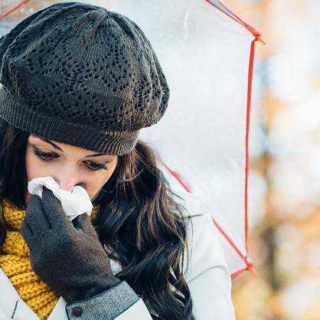Cold and Flu Myths: Shedding Light on the Facts
Let’s face it, cold and flu myths are everywhere. Well-meaning as they may be, many people’s supposed words of wisdom about how to avoid getting sick — and their advice about what you should do once you’ve caught a cold or flu — could probably use a good dose of medicine. Here’s what’s really happening when you have a cold, plus what you can do to get well quickly.
What Is a Cold, and How Do You Beat It?
A cold is your body’s response to a rhinovirus that is replicating in your respiratory tract. These viruses cause coughing, sneezing, stuffy nose, and a general feeling of being run-down. A sore throat is a common side effect of all that coughing and mucus, the slimy stuff your body creates in response to the virus hanging around. So, what do you do to kick that cold?
If your grandmother’s cold-recovery advice was to stay in bed, get lots of rest, drink water, and eat soup, she was right! In people who are otherwise healthy, there are few things that can actually hasten the end of a cold. Over-the-counter medications can help manage the main symptoms, the coughing and mucus. In time — a week to 10 days — a normal body will beat a cold or flu. You’ll start to feel better before then but continue to keep your hands clean and avoid touching your face, so you don’t spread the cold around.
Extra Steps for Fighting Colds
There are also a few other things that can help you on the road to recovery when you have a cold. These include:
- Taking oral zinc. If you take it exactly as described, every two hours from the time you start to feel sick to when your symptoms are gone, might decrease the cold duration. Avoid nasal zinc.
- Rinsing your nose and sinuses. This can help manage the mucus but be sure to use sterile water.
- Taking Vitamin C. If you’re a child or are in challenging physical conditions, this vitamin will give you an extra boost.
So far, zinc taken by mouth is the only supplement that has been proven to lessen the duration of a cold. The Vitamin C tip works for those with less robust immune systems, but it isn’t as useful for healthy adults in normal conditions.
What About the Flu?
The flu is also caused by viruses — but there’s one important step you can take to prevent this illness that you can’t with a cold. Namely, you can get vaccinated: Influenza and the illnesses it causes are mostly preventable with vaccination. Even if you wait to vaccinate, you’ll get less sick than if you never vaccinated at all. While it isn’t perfect, flu vaccination is worthwhile for a simple reason: Nobody dies of rhinoviruses. People do die of the flu, however — hundreds every year, many of them children. Thousands more end up in the hospital with pneumonia.
Truth vs. Myth
Ever heard the flu-prevention adage, “Put on a coat, or you’ll catch your death?” This one is part-myth, part-truth. Cold temperatures alone don’t make you sick, but being chilly, overly tired, or not eating well makes your body less able to fight off a cold or flu virus that you’ve already been exposed to.
So, where’s the truth among all the cold and flu myths? If you want to decrease your odds of getting sick from a cold or flu, it’s all about the basics. In addition to washing your hands and not touching your face, take care of yourself: Stay warm, eat a balanced diet, get enough sleep, and vaccinate against the flu. Plenty of time, rest, and good nutrition — plus a little help from modern medicine — are the most important tools you have for staying well during cold and flu season.



Leave a Reply